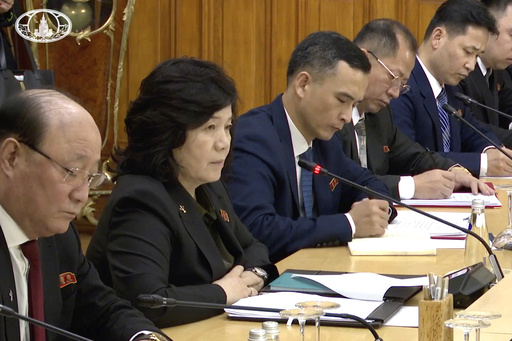Russia’s Foreign Minister hosted his North Korean counterpart on Friday for discussions amidst growing reports indicating that North Korea may have dispatched approximately 10,000 troops to Russia to assist in its military operations in Ukraine.
The meetings between Choe Son Hui and Sergey Lavrov occurred shortly after the Pentagon’s announcement about the troop movements, which are projected to support Russia in fighting against Ukrainian forces within weeks. Western leaders have characterized this North Korean deployment as a notable intensification of military collaboration that could significantly affect diplomatic relations in the Indo-Pacific region.
While the specifics of Choe’s discussions in Moscow have not been disclosed, South Korea’s intelligence agency indicated during a confidential session in parliament that high-level negotiations might be taking place regarding the potential for sending more troops to Russia and the conditions under which North Korea would engage in these arrangements.
Concerns have been raised by South Korean and Western officials that, in exchange for North Korea’s military support, Russia could provide advanced military technology that may enhance the capabilities of North Korea’s nuclear arms and missile systems.
In his meeting with Choe, Lavrov expressed that the relationship between Russia and North Korea has reached an unprecedented level, remarking on their previously established strategic partnership and its implementation. Choe emphasized North Korea’s endorsement of what she referred to as Russia’s “just fight” to protect its sovereign rights and security interests in the ongoing conflict in Ukraine.
Moscow and Pyongyang have remained somewhat vague regarding the claims of troop deployment, insisting that their military cooperation aligns with international law without conclusively acknowledging the presence of North Korean forces in Russia. The United States and its allies have accused North Korea of supplying substantial amounts of artillery shells and other materials to support Russian military initiatives in Ukraine.
Moreover, Russia, alongside China, has blocked U.S.-led attempts at the UN Security Council to impose stricter sanctions on North Korea following its recent missile activities, which have surged in frequency since Russia’s incursion into Ukraine in 2022. Additionally, Russia vetoed a resolution intended to extend monitoring of sanctions against North Korea in March, effectively ending UN oversight of these measures.
Last month, South Korean President Yoon Suk Yeol suggested the possibility of providing military aid to Ukraine while announcing that Seoul is preparing a series of responses that could evolve based on the extent of military cooperation between Pyongyang and Moscow. South Korea, which has emerged as a notable arms exporter, has thus far focused on providing humanitarian aid and non-lethal support to Ukraine, while sidestepping direct weapons supply requests from Kyiv due to its policy against sending arms to nations involved in ongoing conflicts.
In additional news, the Ukrainian air force reported that overnight, Russia launched three aviation missiles and 48 drones, including variants such as Shaheds, against Ukraine. Ukrainian defenses managed to intercept one missile and 31 drones, and 14 drones were jammed while some drifted into Belarusian airspace. Drone debris resulted in damage to several civilian structures, including residential properties in regions such as Poltava, Cherkasy, Kyiv, and Odesa.
Simultaneously, the Russian military claimed to have intercepted and destroyed 83 Ukrainian drones across four regions near the Russian border and Crimea. In Bryansk, a drone reportedly impacted a residential area, although no casualties were recorded. A drone also struck an oil depot in Stavropol, with unverified reports suggesting the facility caught fire.


